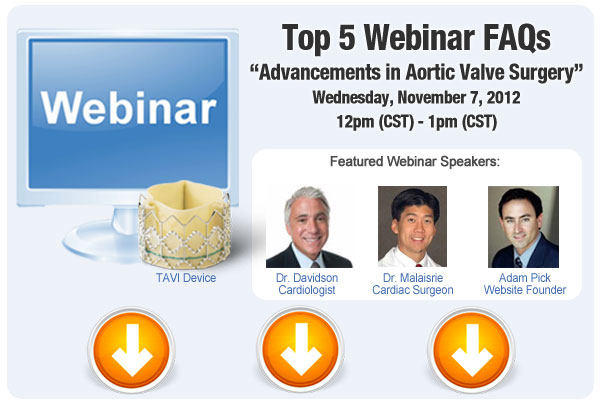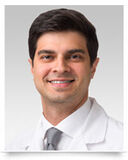Top 5 Questions About Wednesday’s Webinar For Patients
By Adam Pick on November 5, 2012
This Wednesday, November 7th, I am going to host a live, online webinar titled, “Advancements in Aortic Valve Surgery”with Dr. Davidson and Dr. Malaisrie from Northwestern Memorial Hospital.
Already, over 100 patients have registered for this webinar! Given the exciting topic of this educational event, I have received several questions about the webinar from our community. To help you learn more, I have provided below the top five questions about this webinar below.

1. Is The Webinar Free To Attend?
Yes. The webinar is free for all attendees.
2. Can I Still Register For The Webinar?
Yes. Registration is still available. To register, click here.
3. How Do I Connect To The Live Webinar?
It is very easy to connect to the webinar. When you register, we will email you the necessary instructions. All you need is a computer that is connected to the Internet — so that you can see and hear the presentation. You will also have the option to “dial-in” to the webinar using a phone line. Or, you can listen to the webinar through your computer.
4. Can I Ask Questions During (or Before) The Webinar?
Yes. During the webinar, you will be able to ask questions. However, if you have a question, I’d encourage you to ask it now by leaving a comment or email me directly at adam@heartvalvesurgery.com. I’ve already received some great questions.
5. What Will I Learn During The Webinar?
This webinar will help patients and caregivers learn about the latest advancements in aortic valve surgery. In particular, this webinar will focus on transcatheter aortic valve implantation (TAVI), a new form of aortic valve replacement that requires no incision to the patient’s sternum. So you know, Dr. Davidson and Dr. Malaisrie both participated in the clinical trials which led to the first, FDA-approved TAVI device last year. That said, these physicians have great clinical and patient experience with this new technology.
I hope that helped answer your questions about the webinar. If you would like to register for this special webinar, please click here.

Keep on tickin!
Adam
|
Ronald Margrey says on November 6th, 2012 at 1:07 pm |
|
I am will be 63 in March 2013. What are chances that the surgery will change from open heart?? thanks |
 |
|
Bob Lewis says on November 6th, 2012 at 1:27 pm |
|
Have had my St. Jude aortic valve for 25 years. I’m 57 years old. I know the valve in lab tests can last for several decades but can I expect to have it replaced in the next few years? |
 |
|
Alan Fluegge says on November 6th, 2012 at 2:39 pm |
|
I had a stenotic aortic valve (about 0.6 dia) and a rooted aortic aneurysm. The aneurysm was fixed with a synthetic aorta that went up to the arch but did not involve the great vessels. My valve is a Medtronic Freestyle. 1. Why am I told that I have a life time weight lifting restriction of 30#-50# as well as I can’t split wood, etc? My overall experience has been a very good one. I feel much better and I am glad I went through with it. |
 |
|
MJ Samer says on November 6th, 2012 at 8:49 pm |
|
On Jan. 12, 2012, I was the first person to get a transcatheter tricuspid valve replacement at Northwestern Memorial Hospital (NMH) in Chicago. Previously, I had tricuspid valve replaced via traditional open heart surgery at NMH in Oct., 2009. That valve failed unexpectedly after only 2 years.The transcatheter procedure seemed like a good alternative, especially since it hadn’t been that long since I had had open heart surgery. Dr. David Wax performed the transcatheter procedure and it went very well. All echocardiograms since have shown that the new valve is working well. My cardiologist, Dr.R. Andrew DeFreitas, also at NMH, would like me to have a cardiac catheterization done in the next month or two so they can get a good look at the valve and check other heart functions. Recovery after the transcatheter procedure was much easier and shorter than after conventional open heart surgery. I needed a pacemaker a few months later, but that was related to arrhythmia problems unrelated to the transcatheter valve. The pacemaker further helped my recovery. I don’t know how long this new valve will last, but am hopeful that it will keep working for some time. I’m a 65 y/o female and an adult congential heart patient. The surgery in ’09 was my 3rd open heart surgery. Needless to say, I have a lot of respect for all the doctors and surgeons I encountered at NMH. I would recommend this procedure, if it’s presented as an option. |
 |
|
Sandy says on November 6th, 2012 at 10:47 pm |
|
I just happened upon your site and have a question about the webinar tomorrow. I have to have my aortic valve replaced ASAP but they have ruled out the transcatheter procedure so it will be one of the other two methods. Would it still be beneficial for me to attend this webinar? I am very fearful about having this done–I am a 69-year-old female diabetic (type 2) who is in very good health except for the stenotic aortic valve and I recently had a TIA, which resolved very quickly and my hospitalization for that led to the finding about my aortic valve. I just ordered your book and will be reading it as soon as it comes. Thanks for your having this site and the book. |
 |
|
zafar says on November 7th, 2012 at 7:55 am |
|
Why TAVI is not recommended yet for children and young people. My child, 13 year old, has already undergone open heart surgery in 2009 for aortic valve repair but now cardiologist says he need valve replacement. What is the harm if I opt TAVI for my child. |
 |
|
Wanda Headrick says on November 7th, 2012 at 8:05 am |
|
I was recently diagnosed with severe Aortic Valve Stenosis(due to a congenital bicuspid valve) and Aortic Root enlargement. Valve measurement is .6, pressure gradiant is 90, I am told I will need an Aortic Valve and Aortic Root replacement within 18 months – 2 years. I am a 61 yrs old registered nurse, symptom free, working full time(was put on a weight lifting restriction following diagnosis), and quite frankly fee great. My EF is 70%, B/P 117/50. and am not on any prescription meds. I do take some supliments/Vitiamins. I would like to know if there are any Stem Cell Research programs for this type of a diagnosis and where and how to find them and become involved in one. |
 |
|
Larry says on November 7th, 2012 at 11:31 am |
|
Wondering how important is it the numbers of “TAVI” (s) a doctor has preformed … is there a steep learning curve and as a patient is it to my advantage to seek out a doctor that has preformed many as opposed to a few … are there likely to be less complications with a more experienced doc.? |
 |
|
Traci says on November 7th, 2012 at 2:31 pm |
|
If we missed it, will a video or transcript be posted? Thanks! |
 |
|
Bob Lewis says on November 9th, 2012 at 8:44 am |
|
Adam; Thank You Bob Lewis |
 |
|
elena says on November 23rd, 2012 at 9:33 am |
|
I am 55 and I have just been diagnosed with Mitral vave regurgitatio (medium level) also EF 4% slightly enlarged left ventrical plus ASA also Hypokinesis anterior septum mediobasal. I have many syptoms daily do you think I should have a Mitral repair soon |
 |
|
elena says on November 23rd, 2012 at 9:39 am |
|
sorry the EF is 45% not 4 as previously stated |
 |













